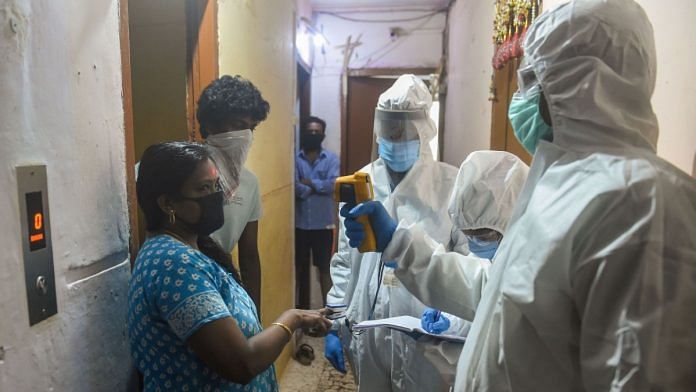New Delhi: The rate at which the novel coronavirus infected the close contacts of a Covid-19 patient was found to be much higher in a cluster of Uttar Pradesh, a new study published by peer-reviewed Indian Journal of Medical Research (IJMR) has stated.
In the study published Tuesday, the secondary attack rate (SAR) of the novel coronavirus stood at 45.5 per cent. The study was titled ‘A preliminary study on contact tracing & transmission chain in a cluster of 17 cases of severe acute respiratory syndrome coronavirus 2 infection in Basti, Uttar Pradesh, India’.
According to The Lancet journal, SAR is defined as “the probability that an infection occurs among susceptible people within a specific group (i.e, household or close contacts). SAR can provide an indication of how social interactions relate to transmission risk”.
“The secondary attack rate of 45.5 per cent was found in the present cluster, which indicated the high infectivity of SARS-CoV-2,” said the study. It means almost half of the close contacts of the Covid-positive patient got infected.
According to the data by the Indian Council of Medical Research, SAR’s average in India in June stood at around 4 per cent. In simple terms, it means that 96 per cent of family or close members did not develop Covid-19 even when one member tested positive.
However, the latest study only reflected the trends and features among the cluster of 17 Covid-19 cases in Basti district of Uttar Pradesh, and not the overall trend in the state.
Also read: 6,76,900 active cases, India’s positivity rate at 7.9%, recovery rate crosses 72%
How infection spreads from one Covid-positive patient?
The study, which has been conducted by several authors, including Dr Rajni Kant, Dr Kamran Zaman and Dr Rajaram Yadav from the ICMR and another team from the Regional Medical Research Centre, Gorakhpur, among others, documented the case of a 25-year-old man from Basti, who died of respiratory failure and was found to be Covid-positive after death.
Contact-tracing carried out by the district administration found 16 cases to be positive among the tested contacts.
The findings of the study showed that the cluster transmission occurred at three levels — first was direct contact with the index case, which resulted in two secondary cases. Index case is the first patient.
“Second, at a household level, where four of the 17 susceptible contacts got infected, and the third was an event (funeral) where 50 individuals participated and this resulted in seven infected individuals in whom infection could be directly linked to a funeral gathering,” the study explained.
The funeral, the study stated, acted as a super-spreader event for the transmission of infection among family members, relatives and others.
“Active contact-tracing and confirmation of infection among the contacts led to the isolation of 16 SARS-CoV-2 positive cases and, hence, the limited spread of the disease,” the study stated.
Asymptomatic carriers, super spreaders major challenges
The study found that “all the 16 cases had a history of contact with the deceased case during his course of illness and at the funeral”.
The result of the study emphasised that “the asymptomatic carriers and super-spreader events are among the major challenges in the control and prevention of SARS-CoV-2 transmission”, while adding that “early testing, quarantine and social distancing may play key role in breaking the chain of transmission”.
Also read: World’s biggest ocean military drill excludes China, virus impact on habits & other Covid news



